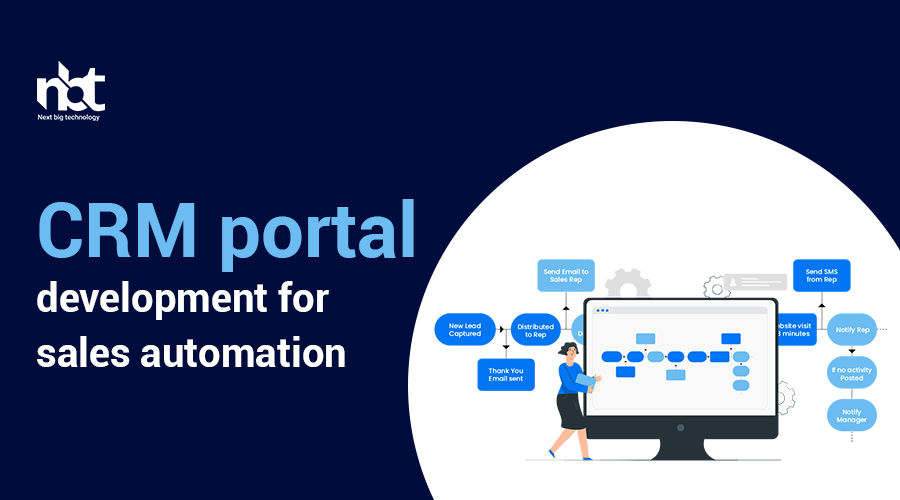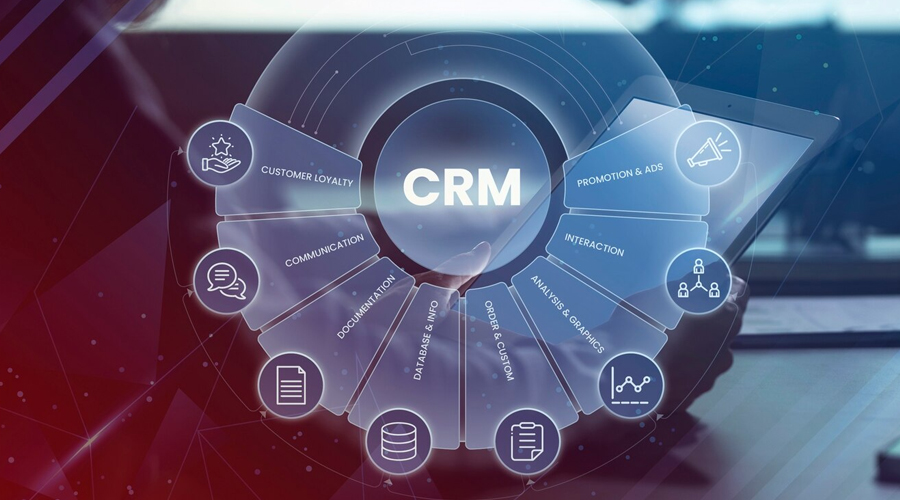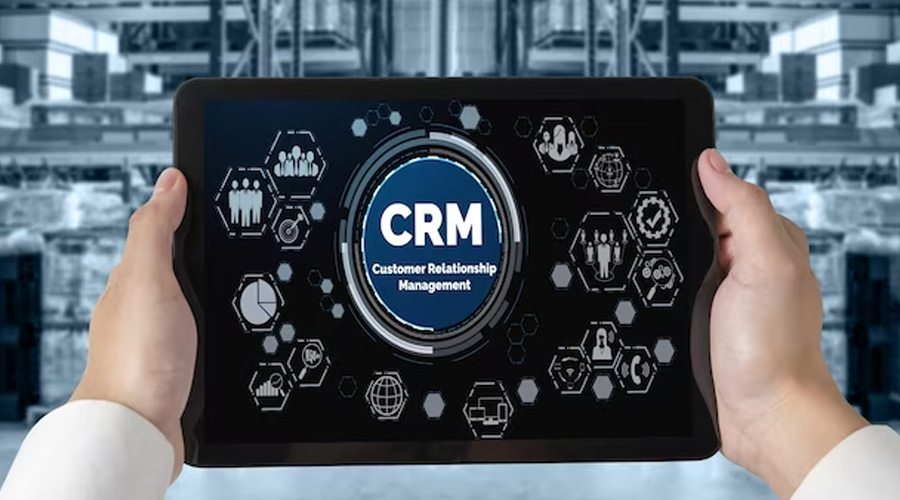Table of Contents
CRM portal development for sales automation Services
In the ever-evolving landscape of sales, efficiency is key. As businesses strive to stay ahead of the curve and meet the demands of their customers, the role of Customer Relationship Management (CRM) systems has become increasingly vital. However, off-the-shelf CRM solutions often fall short of meeting the unique needs of every organization. This is where custom CRM portal development services come into play, offering tailored solutions that streamline sales automation processes and drive business growth.
Understanding the Need for Custom CRM Portal Development: Every business operates differently, with its own set of processes, workflows, and goals. Off-the-shelf CRM solutions may offer a generic approach that fails to address the specific requirements of individual businesses. Custom CRM portal development services bridge this gap by providing personalized solutions designed to align seamlessly with the unique needs of each organization.
Tailored Solutions for Enhanced Sales Automation: Custom CRM portal development services empower businesses to optimize their sales automation processes in a way that suits their operations best. By understanding the intricacies of the business, developers can create bespoke CRM solutions that automate tasks, streamline communication, and improve overall efficiency. From lead management and customer segmentation to sales forecasting and reporting, a custom CRM portal can be tailored to handle various aspects of the sales cycle efficiently.
Integration Capabilities for Seamless Operations: One of the key advantages of custom CRM portal development is its integration capabilities. Businesses often rely on multiple tools and platforms to manage various aspects of their operations. A custom CRM portal can be seamlessly integrated with existing systems, such as email clients, marketing automation software, and ERP systems, ensuring smooth data flow and eliminating the need for manual data entry.
Enhanced User Experience for Increased Adoption: User adoption is crucial for the success of any CRM initiative. Off-the-shelf solutions may present a steep learning curve and lack the intuitive interface that encourages user engagement. With custom CRM portal development services, businesses can create user-friendly interfaces tailored to the specific needs of their teams. By prioritizing user experience, businesses can increase adoption rates and maximize the benefits of their CRM investment.
Scalability for Future Growth: As businesses grow and evolve, so do their CRM needs. Custom CRM portal development services offer scalability, allowing businesses to adapt their CRM systems to accommodate growth and changes in their operations. Whether it’s expanding into new markets, adding new products or services, or scaling up the sales team, a custom CRM portal can be easily customized and scaled to meet evolving business requirements.
How to Create a CRM portal development for sales automation
In today’s fast-paced business landscape, where every interaction matters, sales automation has become paramount for organizations striving to stay ahead of the curve. One of the most effective tools for achieving this is through the development of a Customer Relationship Management (CRM) portal tailored specifically for sales automation. In this guide, we will delve into the process of creating a CRM portal geared towards streamlining sales processes and maximizing efficiency.
Understanding CRM Portal Development
Before diving into the development process, it’s essential to grasp the concept of CRM portals and their significance in sales automation. A CRM portal serves as a centralized platform that enables businesses to manage interactions with current and potential customers. It consolidates customer data, communication history, and sales activities, providing valuable insights to sales teams for better decision-making.
Key Features for Sales Automation
When embarking on CRM portal development for sales automation, integrating the following key features is crucial:
- Lead Management: Implement functionalities for capturing, tracking, and nurturing leads throughout the sales pipeline. This includes lead scoring, assignment rules, and automated follow-up processes to ensure timely engagement.
- Contact Management: Enable users to efficiently manage contact information, including details such as communication preferences, purchase history, and interactions with the company.
- Opportunity Tracking: Develop tools for tracking sales opportunities from initial contact to closure. This involves stages customization, pipeline visualization, and forecasting capabilities to monitor sales performance accurately.
- Task and Calendar Management: Incorporate features for scheduling tasks, appointments, and follow-up activities within the portal. Integration with calendar applications ensures seamless coordination and time management for sales reps.
- Communication Tools: Integrate communication channels such as email, phone, and live chat directly into the CRM portal for streamlined interaction with customers. Automated email templates and drip campaigns can also enhance communication efficiency.
- Analytics and Reporting: Provide comprehensive analytics dashboards and reporting tools to analyze sales metrics, track performance trends, and identify areas for improvement. Customizable reports empower sales managers to make data-driven decisions.
Development Process
The development of a CRM portal for sales automation typically follows these steps:
- Requirement Analysis: Collaborate with stakeholders to gather requirements and define the scope of the CRM portal. Identify user personas, functional specifications, and integration needs.
- Design and Prototyping: Create wireframes and prototypes to visualize the user interface and workflow of the CRM portal. Incorporate feedback from stakeholders to refine the design before proceeding to development.
- Database Design: Design the database schema to store and manage customer data, sales activities, and other relevant information securely. Consider scalability and data integrity requirements during the design phase.
- Frontend Development: Develop the user interface of the CRM portal using modern frontend technologies such as HTML, CSS, and JavaScript frameworks. Focus on creating a user-friendly interface with intuitive navigation and responsive design.
- Backend Development: Build the backend logic and functionalities of the CRM portal using programming languages like Python, PHP, or Node.js. Implement features for data management, user authentication, and business logic execution.
- Integration and Testing: Integrate third-party services and APIs required for CRM functionality, such as email marketing platforms, telephony systems, and payment gateways. Conduct rigorous testing to ensure the reliability, performance, and security of the CRM portal.
- Deployment and Maintenance: Deploy the CRM portal to production servers and perform post-deployment testing to verify system integrity. Provide ongoing maintenance and support to address any issues, implement updates, and enhance features based on user feedback.
Why Should You Go for CRM portal development for sales automation
In today’s competitive business landscape, streamlining sales processes and maximizing efficiency are paramount to success. With the advent of technology, Customer Relationship Management (CRM) systems have emerged as indispensable tools for businesses looking to optimize their sales operations. Among the various options available, investing in CRM portal development stands out as a strategic choice for sales automation. Let’s delve into the compelling reasons why you should consider integrating CRM portal development into your business framework.
- Centralized Data Management: One of the key advantages of CRM portal development is the centralization of customer data. Instead of scattered information across different platforms, a CRM portal serves as a unified repository for all customer-related interactions, including inquiries, purchases, preferences, and feedback. This centralized database empowers sales teams to access real-time information, enabling them to personalize interactions and deliver superior customer experiences.
- Improved Lead Management: CRM portals offer advanced lead management capabilities, allowing businesses to efficiently track and prioritize leads throughout the sales funnel. By automating lead assignment, nurturing, and follow-up processes, CRM portals ensure that no opportunity falls through the cracks. With timely reminders and notifications, sales representatives can focus their efforts on high-potential leads, ultimately driving conversion rates and revenue growth.
- Enhanced Collaboration: In a dynamic sales environment, effective collaboration among team members is crucial. CRM portals facilitate seamless communication and collaboration by providing a centralized platform for sharing insights, updates, and strategies. Whether it’s coordinating sales activities, sharing best practices, or aligning on customer strategies, CRM portals foster a culture of teamwork and synergy, leading to improved productivity and results.
- Streamlined Sales Processes: Manual sales tasks are not only time-consuming but also prone to errors and inefficiencies. CRM portal development automates repetitive sales tasks such as data entry, email tracking, and pipeline management, allowing sales professionals to focus on value-added activities. By streamlining workflows and eliminating redundant tasks, CRM portals optimize sales processes, reducing operational costs and accelerating sales cycles.
- Data-driven Insights: In the era of big data, actionable insights are invaluable for driving informed business decisions. CRM portals leverage advanced analytics and reporting tools to generate comprehensive insights into sales performance, customer behavior, and market trends. By analyzing key metrics such as conversion rates, customer lifetime value, and sales forecasts, businesses can identify growth opportunities, fine-tune strategies, and stay ahead of the competition.
- Scalability and Customization: Every business is unique, with specific requirements and objectives. CRM portal development offers scalability and customization options to adapt to evolving business needs. Whether it’s integrating third-party applications, adding custom features, or scaling up infrastructure, CRM portals provide the flexibility to tailor solutions according to your business goals and preferences.
Market Prospects of Custom CRM portal development for sales automation and Platforms
In the dynamic realm of sales and customer relationship management (CRM), businesses are constantly seeking innovative solutions to streamline their operations, enhance efficiency, and drive revenue growth. Custom CRM portal development has emerged as a pivotal tool in this pursuit, offering tailored solutions to meet the unique needs of diverse businesses across various industries. In this article, we delve into the market prospects of custom CRM portal development for sales automation and platforms, highlighting its significance, benefits, and future outlook.
Understanding the Significance: Custom CRM portal development entails the creation of personalized platforms that cater specifically to the requirements and objectives of individual businesses. Unlike off-the-shelf CRM solutions, custom portals offer unparalleled flexibility, scalability, and functionality, enabling businesses to align their CRM strategies with their distinct workflows, processes, and goals. This bespoke approach empowers organizations to optimize sales automation, streamline lead management, enhance customer interactions, and drive overall business growth.
Benefits of Custom CRM Portal Development:
- Tailored Solutions: Custom CRM portals are designed from the ground up to address the unique challenges and requirements of each business. By aligning closely with the organization’s objectives and workflows, these portals deliver tailored solutions that maximize efficiency and effectiveness.
- Enhanced Integration: Custom portals can seamlessly integrate with existing systems, applications, and databases within the organization’s ecosystem. This integration ensures smooth data flow, eliminates silos, and provides a holistic view of customer interactions and sales processes.
- Scalability and Flexibility: As businesses evolve and grow, custom CRM portals can adapt and scale accordingly. Whether it’s accommodating an expanding user base, incorporating new features, or integrating with emerging technologies, these portals offer the flexibility to evolve in tandem with the organization’s needs.
- Improved User Experience: By customizing the user interface and experience, custom CRM portals enhance usability and productivity for sales teams, administrators, and other stakeholders. Intuitive dashboards, personalized workflows, and seamless navigation contribute to a superior user experience, driving user adoption and engagement.
- Data Security and Compliance: With heightened concerns over data security and privacy, custom CRM portals prioritize robust security measures and compliance standards. From encryption protocols to access controls, these portals safeguard sensitive customer information and ensure compliance with regulatory requirements.
Market Prospects and Future Outlook: The market prospects for custom CRM portal development are exceptionally promising, fueled by the growing demand for tailored CRM solutions across diverse industries. As businesses recognize the limitations of one-size-fits-all CRM platforms and embrace the value of customization, the demand for custom portals is expected to surge.
Furthermore, the proliferation of digital transformation initiatives, the rise of remote workforces, and the increasing emphasis on customer-centric strategies are driving the adoption of custom CRM portals. Businesses are prioritizing investments in technologies that empower them to deliver personalized experiences, optimize sales processes, and foster long-term customer relationships.
Looking ahead, the future of custom CRM portal development is characterized by innovation, collaboration, and continuous evolution. Emerging technologies such as artificial intelligence, machine learning, and predictive analytics will further enhance the capabilities of custom portals, enabling businesses to glean actionable insights, anticipate customer needs, and drive predictive sales strategies.
Essential Features of a CRM portal development for sales automation
In the dynamic landscape of modern business, Customer Relationship Management (CRM) systems have emerged as indispensable tools for companies seeking to optimize their sales processes and enhance customer satisfaction. At the heart of this technology lies the CRM portal, a central hub that facilitates seamless communication, data management, and automation. As businesses increasingly recognize the significance of CRM portal development for sales automation, understanding the essential features of such platforms becomes paramount.
- Intuitive User Interface (UI): A user-friendly interface is fundamental to ensuring widespread adoption among sales teams. An intuitive UI simplifies navigation, minimizes training requirements, and encourages active engagement with the CRM portal.
- Customizable Dashboards: Tailored dashboards empower users to access key metrics and insights relevant to their roles. Customization options enable sales representatives, managers, and executives to personalize their dashboards according to their specific preferences and priorities.
- Contact Management: Effective CRM portal development incorporates robust contact management features, allowing users to store, organize, and update customer information effortlessly. Seamless integration with external databases and social media platforms further enriches contact profiles, facilitating targeted marketing and personalized interactions.
- Lead and Opportunity Tracking: The ability to track leads and opportunities throughout the sales pipeline is essential for driving revenue growth. A comprehensive CRM portal enables users to capture leads, assign ownership, track progress, and forecast sales with precision, thereby optimizing conversion rates and maximizing revenue potential.
- Automated Workflows: Automation lies at the core of sales efficiency. CRM portals should offer advanced workflow automation capabilities, enabling users to automate repetitive tasks, streamline processes, and trigger actions based on predefined criteria. From lead assignment and follow-up reminders to email notifications and task scheduling, automation accelerates sales cycles and enhances productivity.
- Integration Capabilities: Seamless integration with third-party applications and tools is imperative for maximizing the functionality of CRM portals. Integration with email clients, calendar applications, marketing automation platforms, and ERP systems ensures data synchronization across multiple channels, fostering a cohesive ecosystem of interconnected tools and technologies.
- Analytics and Reporting: Data-driven decision-making is facilitated through robust analytics and reporting functionalities. CRM portals should provide comprehensive insights into sales performance, customer behavior, and market trends through interactive dashboards, customizable reports, and predictive analytics tools. These insights empower sales teams to identify opportunities, mitigate risks, and optimize strategies for sustainable growth.
- Mobile Accessibility: In an increasingly mobile-centric world, mobile accessibility is non-negotiable. CRM portals must offer responsive design and native mobile applications to enable users to access critical information and perform essential tasks on the go. Mobile accessibility enhances flexibility, responsiveness, and collaboration, empowering sales teams to stay productive anytime, anywhere.
- Security and Compliance: Safeguarding sensitive data and ensuring regulatory compliance are paramount considerations in CRM portal development. Robust security measures, including encryption, role-based access controls, and audit trails, mitigate the risk of data breaches and unauthorized access, instilling trust among users and stakeholders.
- Scalability and Flexibility: As businesses evolve and grow, scalability and flexibility become imperative. CRM portals should be scalable to accommodate expanding user bases, increasing data volumes, and evolving business needs. Flexible deployment options, including cloud-based and on-premises solutions, empower organizations to adapt to changing requirements while maintaining optimal performance and cost-efficiency.
Advanced Features CRM portal development for sales automation
In today’s fast-paced business landscape, staying ahead of the curve is imperative for any sales-driven organization. One of the most powerful tools at their disposal is Customer Relationship Management (CRM) software. As businesses strive for greater efficiency and effectiveness in their sales processes, the demand for advanced CRM portal development has surged.
CRM portal development goes beyond traditional CRM systems by incorporating cutting-edge features tailored to streamline sales automation. Let’s delve into the advanced functionalities that are revolutionizing the sales process:
- AI-Powered Predictive Analytics: Advanced CRM portals harness the power of artificial intelligence to analyze vast amounts of data and provide predictive insights. By leveraging predictive analytics, sales teams can anticipate customer needs, identify trends, and prioritize leads effectively, ultimately driving higher conversion rates and revenue.
- Personalized Customer Journeys: Today’s customers expect personalized experiences, and advanced CRM portals deliver just that. Through sophisticated segmentation and targeting capabilities, sales teams can tailor their interactions with customers based on their preferences, behaviors, and past interactions. This personalized approach not only strengthens customer relationships but also increases the likelihood of closing deals.
- Integrated Communication Channels: Seamless communication is key to successful sales, and advanced CRM portals offer integration with various communication channels such as email, phone, and social media. This integration allows sales representatives to engage with leads and customers across multiple channels from within the CRM platform, ensuring a consistent and cohesive communication strategy.
- Mobile Accessibility: In a mobile-first world, sales teams need access to CRM data on the go. Advanced CRM portals offer mobile accessibility, enabling sales representatives to manage leads, update information, and track progress from any device, anytime, anywhere. This flexibility empowers sales teams to stay productive and responsive even when they’re away from their desks.
- Workflow Automation: Manual tasks can be time-consuming and prone to errors. Advanced CRM portals automate repetitive tasks and workflows, freeing up valuable time for sales teams to focus on high-priority activities. From lead nurturing to pipeline management, automation streamlines the sales process, improves efficiency, and ensures consistency across the board.
- Advanced Reporting and Analytics: Data-driven decision-making is essential for sales success, and advanced CRM portals provide robust reporting and analytics capabilities. Sales managers can gain valuable insights into sales performance, pipeline health, and individual rep activities through customizable dashboards and reports. This visibility allows for informed decision-making and continuous optimization of sales strategies.
- Integration with Third-Party Tools: To maximize efficiency, advanced CRM portals seamlessly integrate with other essential tools and platforms such as marketing automation software, accounting systems, and e-commerce platforms. This integration eliminates data silos and ensures a cohesive ecosystem, enabling smooth data flow and comprehensive insights across the organization.
CRM portal development for sales automation Timelines
In the fast-paced realm of sales, efficiency is key. Every minute counts, every lead matters, and every interaction can make a significant impact on the bottom line. To navigate this landscape successfully, businesses are increasingly turning to CRM (Customer Relationship Management) portals for sales automation. These platforms offer a centralized hub for managing customer data, streamlining communication, and driving sales growth. However, the journey from conception to implementation of a CRM portal is not without its challenges. Setting realistic timelines is crucial for ensuring a smooth and successful development process.
Why CRM Portal Development?
First and foremost, let’s delve into why CRM portal development is essential for sales automation. A CRM portal acts as a digital command center, allowing sales teams to access vital information about leads, prospects, and customers in real-time. By consolidating data from various sources, such as emails, phone calls, and social media interactions, CRM portals provide a comprehensive view of the customer lifecycle. This enables sales representatives to personalize their approach, anticipate customer needs, and ultimately close deals more effectively.
Moreover, CRM portals facilitate collaboration across departments by enabling seamless communication and task assignment. Marketing teams can align their efforts with sales objectives, while customer support teams can address inquiries promptly, enhancing overall customer satisfaction. Additionally, advanced analytics tools embedded within CRM portals offer valuable insights into sales performance, enabling businesses to identify trends, forecast future revenue, and make data-driven decisions.
The Role of Timelines
Embarking on a CRM portal development journey requires careful planning and adherence to timelines. Setting clear objectives and milestones is essential for keeping the project on track and ensuring timely delivery. Here are some key considerations when establishing timelines for CRM portal development:
- Requirement Gathering: The initial phase involves gathering requirements from stakeholders across the organization. This includes identifying key functionalities, integration needs, and user interface preferences. Setting aside sufficient time for comprehensive requirement gathering is crucial for laying a solid foundation for the project.
- Prototyping and Design: Once requirements are finalized, the next step is creating prototypes and designing the user interface. This phase involves iterative feedback loops to ensure that the CRM portal meets the specific needs of end-users. Allocating ample time for prototyping and design iterations helps refine the user experience and minimize potential rework later in the development process.
- Development and Testing: With the design approved, developers can proceed with building the CRM portal. This phase involves coding, integration with existing systems, and rigorous testing to identify and address any bugs or issues. Setting realistic timelines for development and testing is essential for maintaining project momentum while ensuring the quality and reliability of the final product.
- Training and Deployment: As the development nears completion, it’s crucial to allocate time for training sessions to familiarize users with the new CRM portal. Training ensures that sales teams are equipped with the knowledge and skills to leverage the platform effectively. Additionally, careful planning is required for the deployment process to minimize downtime and ensure a smooth transition from legacy systems.
- Ongoing Support and Optimization: Even after deployment, the journey doesn’t end. Ongoing support and optimization are essential for maximizing the value of the CRM portal over time. This includes monitoring performance metrics, gathering user feedback, and implementing updates and enhancements as needed.
How Much Does It Cost to CRM portal development for sales automation?
In today’s competitive business landscape, maximizing efficiency and streamlining processes are paramount for success. This is where Customer Relationship Management (CRM) systems come into play, offering a robust solution for sales automation and customer management. However, one common question that arises when considering CRM implementation is: How much does it cost to develop a CRM portal tailored to sales automation needs?
The cost of CRM portal development for sales automation can vary significantly depending on various factors such as the complexity of the system, the features required, customization needs, and the chosen development approach (in-house vs. outsourced). Let’s delve deeper into these factors to gain a better understanding of the costs involved.
- Scope and Features: The first step in estimating the cost of CRM portal development is defining the scope and features required. Basic features may include lead management, contact management, opportunity tracking, and reporting. However, more advanced features such as integration with third-party applications, analytics, AI-powered insights, and mobile accessibility will incur additional costs.
- Customization: Businesses often require customized CRM solutions tailored to their unique requirements and workflows. Customization adds complexity to the development process, thus increasing costs. The extent of customization needed will directly impact the overall development expenses.
- Integration: Integrating the CRM portal with existing systems such as ERP, marketing automation tools, or accounting software is crucial for seamless data flow and operational efficiency. However, integration complexities can drive up development costs, especially if the systems involved have incompatible architectures.
- Development Approach: Choosing between in-house development and outsourcing to a third-party vendor is another factor influencing costs. While in-house development may offer more control, it often requires hiring specialized talent and investing in infrastructure, resulting in higher upfront costs. On the other hand, outsourcing development can be cost-effective, especially if you partner with an experienced vendor with a proven track record in CRM development.
- Maintenance and Support: Beyond initial development costs, businesses must budget for ongoing maintenance, updates, and support services. This ensures the CRM portal remains functional, secure, and up-to-date with evolving business needs and technological advancements.
- Licensing or Subscription Fees: Some CRM solutions operate on a subscription-based model, where businesses pay recurring fees for software usage. The pricing structure may vary based on the number of users, features included, and level of support provided by the vendor.
- Training and Adoption: Investing in training programs to educate employees on how to effectively use the CRM portal is essential for maximizing its benefits. Training costs should be factored into the overall budget to ensure successful adoption and user engagement.
How to Create a CRM portal development for sales automation – Team and Tech Stack
In the contemporary business landscape, where customer relationship management (CRM) plays a pivotal role in driving sales and fostering long-term relationships, the significance of a well-crafted CRM portal cannot be overstated. A CRM portal not only streamlines sales processes but also enhances productivity and fosters better collaboration within sales teams. In this article, we delve into the essential aspects of creating a robust CRM portal for sales automation, focusing on the optimal team composition and the technological stack required for seamless implementation.
Understanding the Team Dynamics:
Building a CRM portal for sales automation is a multidisciplinary endeavor that requires the collaborative efforts of various professionals possessing diverse skill sets. Here are the key roles that constitute an effective CRM portal development team:
- Project Manager: The linchpin of the development process, responsible for overseeing the project from inception to delivery, ensuring timely execution, resource allocation, and effective communication among team members.
- Business Analyst: To bridge the gap between the technical team and business stakeholders, analyzing requirements, defining user stories, and translating business needs into technical specifications.
- UI/UX Designer: Crafting an intuitive and user-friendly interface that enhances user experience, fosters engagement, and promotes ease of navigation within the CRM portal.
- Frontend Developer: Proficient in languages like HTML, CSS, and JavaScript, tasked with translating design mockups into responsive and visually appealing frontend interfaces.
- Backend Developer: Responsible for building the server-side logic, database management, and ensuring the seamless integration of various modules within the CRM portal.
- Quality Assurance (QA) Engineer: Conducting rigorous testing procedures to identify and rectify bugs, ensuring the overall reliability, performance, and security of the CRM portal.
- Sales and Marketing Experts: Providing valuable insights into sales processes, customer behavior, and market trends to tailor the CRM portal functionalities according to the specific requirements of the sales team.
Choosing the Right Tech Stack:
Selecting the appropriate technological stack forms the foundation of a robust CRM portal development process. Here’s a rundown of the essential components:
- Backend Framework: Opt for robust and scalable frameworks like Django, Ruby on Rails, or Laravel, which facilitate rapid development, maintainability, and seamless integration with other systems.
- Database Management System: Choose a reliable database management system such as MySQL, PostgreSQL, or MongoDB, depending on the scalability and complexity of data handling requirements.
- Frontend Technologies: Leverage modern frontend frameworks like React.js, Angular, or Vue.js to build dynamic and interactive user interfaces that ensure a smooth user experience across devices.
- API Integration: Integrate APIs for essential functionalities like email marketing, lead generation, and customer support, leveraging platforms such as Mailchimp, Salesforce, or Zendesk to enhance the CRM portal’s capabilities.
- Security Measures: Implement robust security measures, including data encryption, user authentication, and role-based access control, to safeguard sensitive customer information and prevent unauthorized access.
- Scalability and Performance Optimization: Employ caching mechanisms, load balancing techniques, and CDN (Content Delivery Network) integration to optimize the CRM portal’s performance and ensure scalability to accommodate growing user demands.
- Analytics and Reporting Tools: Integrate analytics and reporting tools such as Google Analytics, Mixpanel, or Tableau to gain valuable insights into customer interactions, sales metrics, and CRM portal performance, facilitating data-driven decision-making.
CRM portal development for sales automation Process
In today’s fast-paced business landscape, sales automation has become indispensable for companies striving to stay ahead of the curve. One of the most effective tools for achieving this is through Customer Relationship Management (CRM) portals. These portals serve as centralized platforms that empower sales teams to manage customer interactions, streamline processes, and drive revenue growth. In this article, we’ll explore the significance of CRM portal development for sales automation processes and how it can revolutionize your business operations.
Understanding CRM Portal Development:
CRM portal development involves the creation of a digital platform tailored to the specific needs of your sales team and customer base. These portals are designed to integrate seamlessly with existing systems, such as customer databases, marketing platforms, and communication tools. By consolidating data and functionalities into a single interface, CRM portals provide a holistic view of customer interactions and enable more informed decision-making.
Benefits of CRM Portal Development for Sales Automation:
- Enhanced Customer Insights: CRM portals aggregate customer data from various touchpoints, including emails, calls, and social media interactions. This comprehensive view allows sales representatives to understand customer preferences, behaviors, and pain points better, enabling personalized engagement strategies.
- Improved Lead Management: With CRM portals, leads can be tracked and managed throughout the entire sales lifecycle. Automated lead scoring mechanisms prioritize prospects based on their likelihood to convert, ensuring that sales efforts are focused on high-potential opportunities.
- Efficient Communication: Communication is streamlined through CRM portals, with features such as integrated messaging, email templates, and scheduling tools. This ensures that sales representatives can engage with leads and clients promptly, fostering stronger relationships and increasing sales velocity.
- Sales Process Optimization: By automating repetitive tasks and standardizing workflows, CRM portals eliminate bottlenecks in the sales process. Sales teams can efficiently move leads through the sales funnel, resulting in shorter sales cycles and higher conversion rates.
- Data-driven Decision Making: Real-time analytics and reporting capabilities provide valuable insights into sales performance, campaign effectiveness, and customer trends. Armed with this data, sales managers can identify areas for improvement and implement targeted strategies to drive growth.
Key Features of a CRM Portal:
- Customizable Dashboards: Personalized dashboards allow users to access relevant information at a glance, such as sales pipelines, lead status, and performance metrics.
- Integration Capabilities: Seamless integration with third-party applications, such as marketing automation tools and accounting software, enhances the functionality of CRM portals and ensures data consistency across platforms.
- Mobile Accessibility: Mobile-friendly interfaces enable sales representatives to access CRM portals on-the-go, empowering them to stay productive and responsive regardless of their location.
- Security Protocols: Robust security measures, including encryption, role-based access control, and audit trails, safeguard sensitive customer data and protect against unauthorized access.
Next Big Technology – Your Trusted CRM portal development for sales automation Partner
In today’s dynamic business landscape, staying ahead of the curve requires more than just innovative products or services; it demands strategic sales automation. With Next Big Technology’s cutting-edge CRM portal development, businesses can revolutionize their sales processes and propel growth like never before.
Customer Relationship Management (CRM) systems have become indispensable tools for businesses of all sizes. They streamline sales workflows, enhance customer interactions, and provide invaluable insights for informed decision-making. However, not all CRM solutions are created equal. Next Big Technology stands out as your trusted partner in delivering tailored CRM portals that align perfectly with your unique business needs.
Our approach to CRM portal development is centered around empowering your sales team to excel. Through seamless integration of advanced features, intuitive interfaces, and robust analytics, we enable your team to focus on what they do best – selling. Here’s how our CRM portal solutions can transform your sales automation:
- Customization for Your Business: We understand that every business has its own processes and requirements. That’s why our CRM portals are fully customizable to adapt to your specific workflows, ensuring maximum efficiency and productivity.
- Streamlined Lead Management: Say goodbye to manual lead tracking and follow-ups. Our CRM portals automate lead management processes, allowing your team to prioritize leads, track interactions, and nurture prospects effortlessly.
- 360-Degree Customer View: Gain deeper insights into your customers with a comprehensive view of their interactions, preferences, and purchase history. By understanding your customers better, you can tailor your sales approach for maximum impact.
- Sales Pipeline Optimization: Our CRM portals provide real-time visibility into your sales pipeline, enabling you to identify bottlenecks, forecast accurately, and optimize your sales strategy for accelerated growth.
- Mobile Accessibility: In today’s mobile-centric world, sales teams need access to CRM tools on the go. Our mobile-responsive CRM portals ensure that your team can stay connected and productive from anywhere, at any time.
Partnering with Next Big Technology for CRM portal development means more than just implementing software – it’s about driving tangible results and fostering long-term success. Our dedicated team of experts works closely with you at every step of the process, from initial consultation to post-launch support, to ensure that your CRM solution delivers maximum value to your business.
Enterprise CRM portal development for sales automation
In today’s fiercely competitive business landscape, maximizing sales efficiency is paramount for companies aiming to stay ahead of the curve. As businesses expand and customer bases grow, managing interactions and relationships becomes increasingly complex. This is where Enterprise CRM (Customer Relationship Management) portal development steps in as a game-changer, offering streamlined solutions for sales automation and improved customer interactions.
Understanding Enterprise CRM Portal Development: Enterprise CRM portal development involves the creation of a centralized platform that integrates various aspects of customer interaction and sales processes. This includes managing leads, tracking customer interactions, analyzing sales data, and facilitating communication between sales teams and clients. By consolidating these functions into a single interface, CRM portals provide a holistic view of customer relationships and empower sales teams to make data-driven decisions.
Streamlining Sales Processes: One of the primary benefits of enterprise CRM portal development is the automation of sales processes. By implementing features such as lead management, opportunity tracking, and automated workflows, CRM portals enable sales teams to work more efficiently. Automated reminders and notifications ensure that no lead falls through the cracks, while customizable pipelines allow for the adaptation of sales processes to suit specific business needs.
Enhancing Customer Interactions: Effective communication is key to building strong customer relationships, and CRM portals play a vital role in facilitating this. Through features like email integration, live chat support, and customer portals, businesses can engage with their customers more effectively. Personalized communication based on customer preferences and past interactions helps foster a sense of trust and loyalty, ultimately leading to higher conversion rates and increased customer satisfaction.
Harnessing Data Insights: In the age of big data, harnessing insights from sales data can provide businesses with a competitive edge. Enterprise CRM portals offer robust reporting and analytics tools that allow companies to gain valuable insights into their sales performance. From tracking key metrics to identifying trends and forecasting future sales, these tools empower businesses to make informed decisions and optimize their sales strategies for maximum effectiveness.
Improving Collaboration and Accountability: Collaboration is essential for success in sales, and CRM portals facilitate seamless collaboration among team members. With features such as shared calendars, task assignments, and document sharing, sales teams can work together more effectively, ensuring that everyone is on the same page. Additionally, CRM portals provide visibility into individual and team performance, promoting accountability and driving continuous improvement.
Top CRM portal development for sales automation Companies
In the fast-paced realm of sales, efficiency is paramount. Every lead, every interaction, and every opportunity must be managed seamlessly to drive revenue and foster lasting customer relationships. This is where Customer Relationship Management (CRM) systems come into play. With the right CRM portal development company, businesses can streamline their sales processes, automate tasks, and ultimately boost productivity. Let’s explore some of the top CRM portal development companies that excel in sales automation:
-
-
Next Big Technology:
Next Big Technology is one of the top development companies for the high-quality development of mobile apps and web development services. They have having experienced in-house team of developers who provide top-notch development services according to the business requirements. NBT provides highly business-oriented services and implements all the latest and trending tools and technologies. They always work hard to deliver a top-notch solution at an affordable cost. They are having experience of more than 13 years and delivered lots of projects around the globe to businesses and clients.
NBT is highly focused on providing top-notch development solutions at a very affordable cost. By using their market experience and development experience, they are delivering proper solutions to clients and various industries for their custom requirements.
Location: India, USA, UK, Australia
Hourly Rate :< $25 per Hour
Employees: 50 – 249
Focus Area
- Mobile App Development
- App Designing (UI/UX)
- Software Development
- Web Development
- AR & VR Development
- Big Data & BI
- Cloud Computing Services
- DevOps
- E-commerce Development
Industries Focus
- Art, Entertainment & Music
- Business Services
- Consumer Products
- Designing
- Education
- Financial & Payments
- Gaming
- Government
- Healthcare & Medical
- Hospitality
- Information Technology
- Legal & Compliance
- Manufacturing
- Media
-
- HubSpot: HubSpot’s CRM portal development services are renowned for their user-friendly interface and comprehensive toolset. From contact management to email automation, HubSpot simplifies sales tasks while providing valuable insights into customer behavior. Its seamless integration with marketing and service tools further enhances collaboration across departments, driving efficiency and alignment.
- Microsoft Dynamics 365: Backed by the power of Microsoft, Dynamics 365 offers a versatile CRM solution tailored for sales automation. Its intuitive interface, coupled with advanced AI capabilities, enables sales teams to prioritize leads, forecast revenue, and personalize interactions effectively. With seamless integration with Office 365 and LinkedIn Sales Navigator, Dynamics 365 empowers businesses to leverage data-driven insights for superior customer engagement.
- Zoho CRM: Zoho CRM stands out for its affordability and scalability, making it an ideal choice for small and medium-sized businesses. Despite its competitive pricing, Zoho CRM doesn’t compromise on features, offering robust sales automation tools such as workflow automation, pipeline management, and AI-driven analytics. With its modular structure, businesses can tailor the CRM portal to their specific needs, ensuring maximum efficiency.
- Pipedrive: Focused on simplicity and effectiveness, Pipedrive excels in streamlining the sales process from lead generation to deal closure. Its visual pipeline interface provides a clear overview of sales activities, allowing teams to prioritize tasks and track progress effortlessly. With automation features like email tracking and workflow automation, Pipedrive empowers sales professionals to focus on building relationships and closing deals.
FAQs on CRM portal development for sales automation
In today’s dynamic business landscape, Customer Relationship Management (CRM) systems have become indispensable tools for companies aiming to streamline their sales processes and enhance customer satisfaction. Among the various components of CRM, the development of a robust CRM portal tailored for sales automation is crucial for achieving efficiency and effectiveness in managing customer interactions and sales pipelines. As businesses delve into the realm of CRM portal development, numerous questions arise. Here, we address some frequently asked questions (FAQs) to provide clarity and insights into this essential aspect of sales automation:
- What is a CRM portal, and how does it differ from traditional CRM systems? A CRM portal serves as a centralized platform that enables users to access, manage, and analyze customer data, sales activities, and communication channels. Unlike traditional CRM systems that primarily focus on backend processes, CRM portals offer a user-friendly interface for sales representatives, managers, and even customers to interact with the CRM system seamlessly.
- What are the key benefits of developing a CRM portal for sales automation? Developing a CRM portal for sales automation brings several benefits, including:
- Enhanced accessibility: Sales teams can access critical data and tools anytime, anywhere, fostering productivity and agility.
- Improved collaboration: CRM portals facilitate collaboration among team members by providing real-time updates, task assignments, and communication channels.
- Customization options: Businesses can tailor the CRM portal to align with their specific workflows, processes, and branding, thereby optimizing user experience and engagement.
- Data-driven insights: Advanced analytics and reporting features empower organizations to derive actionable insights from customer data, leading to informed decision-making and strategic planning.
- What are the essential features to consider when developing a CRM portal for sales automation? When developing a CRM portal for sales automation, it’s essential to incorporate features such as:
- Customer data management: Comprehensive customer profiles, contact information, purchase history, and interaction logs.
- Sales pipeline tracking: Visual representations of sales pipelines, deal stages, and progress indicators for effective sales management.
- Communication tools: Integration with email, messaging, and telephony systems for seamless communication and follow-up.
- Task and calendar management: Scheduling appointments, setting reminders, and assigning tasks to team members to ensure timely follow-ups and customer engagement.
- Integration capabilities: Seamless integration with other business systems such as ERP, marketing automation, and e-commerce platforms to streamline operations and data flow.
- How can businesses ensure the security and privacy of data within the CRM portal? Data security is paramount when developing a CRM portal. Businesses can ensure the security and privacy of data by implementing robust authentication mechanisms, encryption protocols, role-based access controls, and regular security audits. Additionally, compliance with industry regulations such as GDPR, CCPA, and HIPAA (where applicable) is essential to safeguard customer data and maintain trust.
- What are the common challenges associated with CRM portal development, and how can they be addressed? Some common challenges in CRM portal development include integration complexities, user adoption issues, data migration hurdles, and scalability concerns. Addressing these challenges requires careful planning, stakeholder engagement, training programs, and ongoing support and maintenance efforts. Leveraging the expertise of experienced CRM developers and adopting agile development methodologies can also mitigate risks and ensure project success.
Thanks for reading our post “CRM portal development for sales automation”. Please connect with us to learn more about the CRM portal development.
























